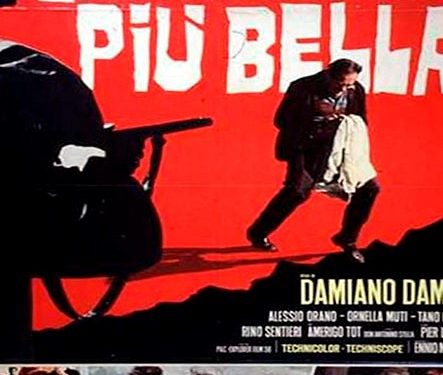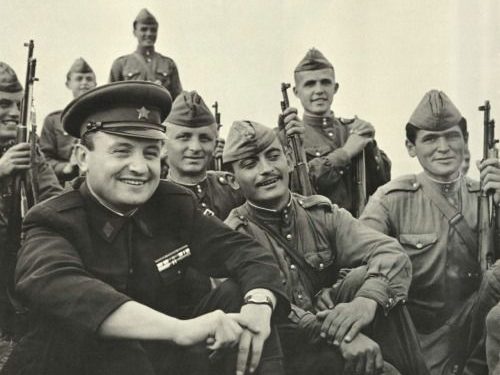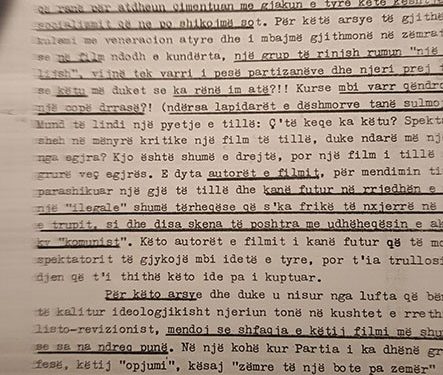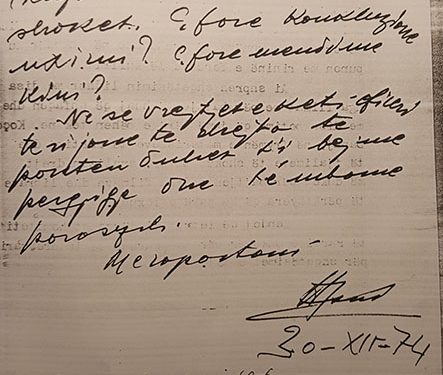Dashnor Kaloçi
Memorie.al publishes secret documents of 1974 with correspondence between the Central Committee of the SPL signed by Hysni Kapo and the personal secretary of Enver Hoxha, Haxhi Kroi, with the Party Committee of the Shkodra district regarding the letter of the border officer, Koco Danaj, sent to the cabinet of Enver Hoxha, demanding that foreign films such as “Confessions of the Police Commissioner”, “The Most Beautiful Woman”, and some books such as … be banned and removed from circulation.
The generation of Albanians who were in their early teens remembers very well the breakdown of ticket counters and movie theaters around the country when foreign films were shown. those of the famous Italian director Damiano Damiani, “The Most Beautiful Woman” (La moglie piu bella) starred by actress Ornela Muti, (then 14) in the role of Francesca Chimarosa and Alesio Orano in the role of Vito Juvara, or ” Confessions of a Police Commissioner ”, with the lead role played by the great Franco Nero, (and in other roles, Martin Balzam and Marik Toro), films that made a huge fuss and were received with great interest by the art-loving public Albanian even for the fact that at the center of the film was the Italian mafia of that time. But the brilliance of these films did not last long and faded away, as suddenly there by the end of 1974, as if by magic, they disappeared forever from circulation to never appear in Albanian cinemas, where, along with the sport, they were almost the only entertainment or more precisely the little “frills” from which the outside world could barely be seen from that isolated reality and the closure in which the high Communist leadership headed by Enver Hoxha had entered the country.
Although in the ensuing years the world-famous Italian director Damiano Damiani would still be a “guest” in communist Albania with the film “La Piovra” starring the extraordinary actor Mikele Placido in his films ” The Most Beautiful Woman “and” Confessions of a Police Commissioner “would remain a beautiful memory of the past, and the portraits of actors Ornela Muti, Alesio Orano, Franco Nero, etc would not be easily erased in the memory of the youth of that time… But what happened to these films and why did they not appear in Albanian cinemas where the “ritual” with foreign and Italian films continued ?! The truth of this, namely the banning of two Damian films that were once shining with its mastery in starving Europe for Italian cinema, no one knows to this day, as almost everyone who made the decision to ban those films have been separated from this life for years.
But fortunately, the only witness who is still alive is exactly the character who became the trigger, or more precisely the one who “disappeared” those two films from circulation, and with them the Romanian film “Saint Theresa and the Devils”, (by famous director Serju Nicolaescu, played by Hungarian minority actress Reka Nagi), TV series, Czechoslovak production, “Captain Klos”, (original title, “Higher Price than Life” ), as well as some “yellow” books such as “Yellow Dog” (by George Simeon), etc. He is Koco Danaj, originally from Tepelena, a well-known public figure since the 1990s as a publicist and researcher, but also of the political environment as the leader of a small party that served in 1974 as an officer for the Border ( youth secretary), at the Shkodra Branch of Internal Affairs, and at the same time a member of the Central Committee of the Albanian Youth Labor Union, sent a letter to Haxhi Kroi, the secretary of Enver Hoxha, requesting the prohibition of the above-mentioned films and books… Graduated that year from the Faculty of Philology of the University of Tirana, a connoisseur of several foreign languages and with an enviable cultural background and luggage (mainly for his knowledge of world literature and cinematography), but also indoctrinated abroad mass, in his letter sent to the cabinet of Enver Hoxha, Koco Danaj, has analyzed in detail why those films and books had no place in Socialist Albania. So, above all, it seems that it was not only the communist regime with the relevant propaganda institutions that “blindfolded four” in order not to “infiltrate foreign ideology” in Socialist Albania, but also “vigilant guards” made individual individuals, as in the case in question, which did not have that functional function. And as a result, it seems that the letter of the new officer, Danaj, was “in place” at the time, as the films and books he “suggested” were banned, not only removed from circulation but some institutions that had them independence, like Kinostudio “New Albania”, “Naim Frashëri” Publishing House of Albanian Radio and Television had many problems because they had allowed or put them into circulation. Not only that, but the letter of the new Border Officer was so “thin” that it embarrassed even the senior leadership of the then APL, such as Hysni Kapon, Piro Kondi, etc., that did not know how, where and what answer to give him as its author ?! Interestingly, why that letter from Enver Hoxha’s cabinet was not sent to Ramiz Alia for “review” covering art, culture, and propaganda, but to Hysni Kapos, who covered the organs of the “Dictatorship of the Proletariat” ?! Concerning these and other, he knows the letters in question which is published in full and for the first time on the pages of this book and also exclusively for Memorie.al.
LETTER OF KOCO DANAJ TO THE SECRETARY OF ENVER, HAXHI KROI
secret folder
Comrade Haxhi Kroi
I am addressing this letter and I have two goals, maybe I can serve the Party a little and secondly to clarify myself.
The problem I want to clarify is about the practical implementation of Comrade Enver’s March 15 speech and the 4th Plenum. Specifically, I am referring to some films that have appeared in our cinema and television screens, as well as some translated books.
To the extent that I have understood the teachings of Party and Comrade Enver, especially on the widespread bourgeois-revisionist ideological pressure, it seems to me that these films and books are harmful to us, but from conversations I have had with friends and with people adults, a good part of them have called me wrong. For this reason, I am not very clear and do not know what is wrong or right.
I am trying to briefly tell you, as I understand it, some of the ideas of some films that I think are harmful to us, and I wish that the Party would be able to explain to me what was wrong and what was right.
The film “St. Theresa and the Devils” is a film where the authors try to give us an aspect of the Romanian people’s struggle against the German fascists and more specifically the episode of the destruction of a bridge. After the action, partisans who blasted the bridge were killed. All of this is completely justifiable, but the ways and details the authors choose to make such an event unacceptable. Recognizing the opinions of the classics of Marxism-Leninism and the history of the National Liberation War led by our Party, I think the ideas of this film run counter to our conception of the National Liberation War.
What are the ideological flaws of the film, starting from the positions of Marxist-Leninist ideology?
First, our people have a proverb that says “Do not look only when the river flows, but also see where it flows.” The film begins with the disaster of one of the heroes, caused by two white horses, which at the end of the film becomes reality.
Secondly, the morale of our partisans and partisans during the National Liberation War was pure morality and, as such, dusted the reactionary slogans of the National Ballet and its henchmen over the morale of the Communists. war theme, through some nudist schemes, the love adventures of the two “communists” come to light.
Third, according to the teachings of our Party, we know that those who fell for the homeland cemented with their blood this castle of socialism that we are looking at today. That’s why we all bow down to them and always keep them in our hearts. In the film, to the contrary, a group of young Romanians, “a group of smileys,” come to the grave of five partisans and one of them says; here it seems to me that they have fallen? Whereas a piece of chalk was hanging over the tomb? (While our martyrs attack the sky). Such a question may arise: What is wrong here? Does our spectator view such a film critically by separating the wheat from the weeds on one side? That’s right, but such a movie has no grain except weeds. The second film authors, in my opinion, have foreseen this and have introduced in the course of events a very attractive “illegal” that is not afraid to highlight body shapes, as well as some sneaky scenes with the leader of the action, this “communist”. These filmmakers have introduced them to not allow the spectator time to judge their ideas but to overwhelm the mind to absorb these ideas without understanding them.
For these reasons, and given the party’s struggle to ideologically temper our man under the conditions of imperialist-revisionist siege, I think that the screening of this film is more about work than about work. At a time when the Party has given overwhelming punches to religion, to this “opiate” of this “heart of a world without a heart”, to rid man of the terrible anxiety of prejudice, our spectator looks at the realism of a religious superstition, at a time when The party wages a great struggle to preserve the morals and feelings of our people, as it teaches all the people to be characterized in work and in life by the seven virtues of our partisans and partisans during the National Liberation War, our spectator watching sneaky scenes of committed by a “communist”, at a time when our party porosity that, moving forward, turn our backs on those who fell when it is said in the mouth of the people; “We have shed blood with oaks, so this earth is thriving”, when Partija and all our people on the anniversary of their fall stutter the famous verses, “O comrades, what do you have for years and you too”, our spectator he watches a group of “horrors,” standing for a moment where five people have fallen, grinning, while on the tomb stands “a scoundrel”, a piece of plank. Here’s a tribute to the fallen. So what does our spectator need for this spiritual nourishment when we still have politically and ideologically unformed people? According to Marxism-Leninism, human consciousness is never empty, socialist or bourgeois-revisionist ideology stands in its place, and although Marxist-Leninist ideology has not fully entered into the consciousness of many people, why fill this gap with such ideas as may to give them any kind of name but not a Leninist Marxist?
“The Most Beautiful Woman” is an Italian film that addresses a social theme. Through this film, the authors try to persuade people about the opposite of what happens in capitalism, try to portray life not as it really is, but as it is concerned with the monopolistic bourgeoisie. In our Party’s view, in the face of the heightened class struggle and in the face of a general socio-economic crisis, the bourgeoisie seeks to eradicate any democratic freedom, takes every measure to maintain its order undisturbed. All her apologists’ sermons on the harmony of this order, on the welfare and great liberties enjoyed by the individual, are utterly false. Comrade Enver’s 1967-1968 Reports and Speeches, page 134, states: “In the capitalist-revisionist regimes the appurtenances of liberty are false; the individual, the liberation of women from the capitalist yoke and pure feelings. ”
The question is: What does our spectator have to learn from this film? Yes, there are, but more negative than positive. I say this because in some translated films and novels it happens as our Party says; the enemy inserts his poison without feeling it, not to say that it is poison, but accompanied and with some positive aspects. Does the whole movie revolves around the “love” that a powerful bourgeoisie feeds on a girl and the girl’s struggle until she is thrown into prison, with the support of the police ?! It is interesting that every time they try to put their poison into it, they associate it with fine artists and fine phraseology. The film’s authors try to convince people that, on the basis of marriage in capitalist countries, love and pure feelings lie, but according to Marxism-Leninism, capitalism is based on marriage, not on love. In this society love and feelings are served by private property. Furthering this view, Comrade Enver points out that; though marriage is a social act, it ultimately has its philosophy in both the bourgeois and socialist order. “On the basis of this marriage (bourgeois marriage), it is not the pure feelings but the wild feelings of property and private interest in wealth, inheritance, fornication of husband and wife that do not lie.”
Second, the film’s authors try to persuade the viewer that a woman in bourgeois society enjoys all rights, presenting us with a “brave and emancipated” woman who fights against injustice and imprisons her ex-boyfriend. This idea, too, is in stark contrast to what happens in bourgeois reality. According to Marxism-Leninism, if there is a lower and lower contempt for capitalist society and precisely that of the religious institution, in assessing for women it becomes clear what role women have in this society of the “slave of God in heaven, the master of heaven. land, of the husband at home. ”
Here’s one of the countless evaluations of religion the woman. In reports and speeches from 1967-1968, Comrade Enver states, inter alia; “Whether in the Renaissance or in modern times and ostensibly refined civilization,” the bourgeois contingent, the woman has been and is the most enslaved, oppressed, most despised human being in every respect.
Third, the authors of the film present us with very democratic police that strives and cares about everyone alike. Such an idea has its source in the bourgeois theorists’ sermons on “the state of general friendship, on the state as an organ outside the classroom”. According to Marxism-Leninism, all these people are nothing but “bastards” with a degree in the service of the bourgeoisie “, her puppets which she changes whenever they do not serve her well. This is made more compelling by the fact that in the place where the darkest forces, such as the Italian neo-fascists, begin to resurrect, it is impossible in such a country to have such freedoms that so many bourgeois servants talk about. Some time ago, a Czech-themed film about the war of the Czech people against the German occupation appeared on our television screen. From all the episodes that the film has, as well as from the ending itself, I think this film is completely revisionist. Why? Having finished watching the film, in my opinion, brings out two ideas that the authors try to say. The first idea is this: “people, do not fight, do not see that the war is terrible.” The second idea “don’t try in vain to resist the Gestapo, the best resistance you can make is to end your life, no matter your beliefs, whether communist or whatever, kill yourself to save yourself. from torture ”.
I’m trying briefly to make it clearer. The Gestapo seizes a Czech Communist and some of his hosts. As the Gestapo asks the Communist, in a room was a terrible giotin, who began to cut off people’s heads. The Czech Communist, “not being able to bear her temper and serving as a warning to her, cuts the veins in her hands and dies. It seems to me that this is deheroism. The film does not feel the resistance that the Czech people made, the other side of the war, the high ideals, and intentions on behalf of which the revolutionaries gave their lives in that war. The idea of Czech authors and “Communists” is diametrically opposed to the idea and attitude of Julius Fuikutikutik summarized in the statement “People, I loved you, be vigilant”.
Didn’t the German Nazis, with Hauzding at the helm, test the inhumane torture that existed until then in Manush Aliman’s body? They tried it all, but he endured it because he had an idea, a lofty goal, he had the teachings of the Albanian Communist Party that made the Gestapo’s hangman mad. Manush Alimani did not cut his veins, but stuttered during each torture the fervent words “Plague of rage and fury, long live the Party”. So another picture is created by our man recognizing the National Liberation War and another seeing such a movie. A film that evokes, a film with vile ideas, a film that evokes pessimism and powerlessness against the occupier, a film that preaches subjugation and captivity is quite detrimental to our spectator.Memorie.al
follows tomorrow












![“Count Durazzo and Mozart discussed this piece, as a few years prior he had attempted to stage it in the Theaters of Vienna; he even [discussed it] with Rousseau…” / The unknown history of the famous Durazzo family.](https://memorie.al/wp-content/uploads/2026/02/collagemozart_Durazzo-2-350x250.jpg)




